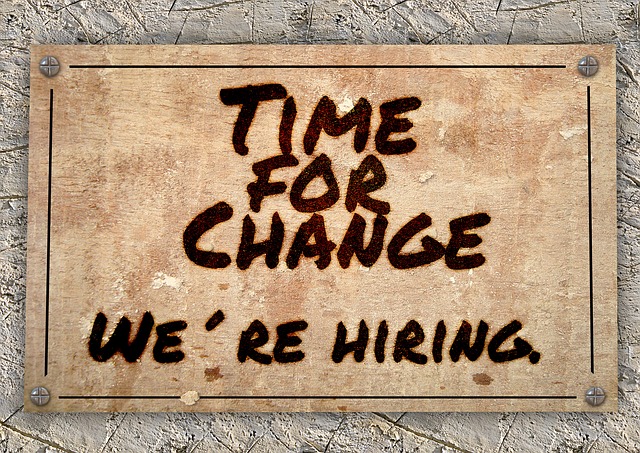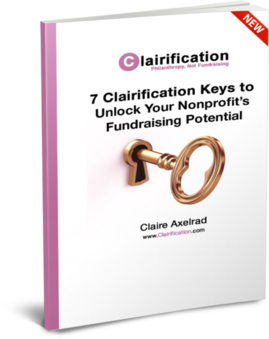 Did you have a New Year’s resolution to look for a new development position? Or maybe to transition to work in the social benefit sector?
Did you have a New Year’s resolution to look for a new development position? Or maybe to transition to work in the social benefit sector?
Have you put your job search off, wondering how your skills translate to what you’d really like to do?
We all have an inner critic telling us super unhelpful things like:
- You’re not ready yet.
- You need another course or degree.
- You need more years of experience doing x, y, and/or z.
- You need time to prepare.
- You aren’t good at this (math/negotiating/technical/financial/digital/sales) stuff.
- You aren’t as confident as other people.
- You can’t take this leap; it’s too risky.
These are all variations on the theme of “you don’t have what it takes.”
Nonsense!
This is a totally irrational fear. Your inner critic is perhaps trying to protect and defend you, but actually this critic is holding you back by ruminating on the risks and worst-case scenarios. If you always play it “safe,” you’ll never grow.
Today, I’d like to tell you what it actually takes to be an effective fundraiser.
I hope you’ll see these innate qualities and strengths are things you have already. All you need to do is formulate them into a pitch format you can use when you interview for a job.
5 Innate Qualities and Strengths of Effective Fundraisers: E-I-E-I-O
The outstanding fundraiser is similar in many ways to a farmer (aka ‘Old MacDonald’). They sing a similar tune and also work in a nurturing, productive space that enables cultivation and growth. You may never have considered a “moo moo” here and there could be the key to your success, but there’s nothing as important as “mooooving” folks along a continuum – from awareness, to interest, to engagement, to investment – when it comes to generating the resources needed for nonprofits to survive and thrive.
The effective fundraiser must embody all of these qualities. If you learn to talk about yourself this way, you’ll be well on your way to landing your next job.
E = Exuberance
A fundraiser needs to be a good coach and cheerleader who leads others – board members, volunteers, the executive director and other staff – to success. Success in fundraising means instilling a culture of philanthropy organization-wide; not being a one-person band. So, yes, exuberance is key. Kind of a secret weapon.
I don’t mean this in the sense of perky rah-rah, but in the sense of being optimistic and taking initiative. An optimist is future-oriented and tries to do things that haven’t been done before. They see potential, don’t rest on their laurels and aren’t satisfied with the status quo. They understand that people invest in hope, and offer others the opportunity to make a real difference. They are the opposite of passive. They have an uncanny ability to see a problem and take action to address it.
This aligns with a quality of effective salespeople – what Daniel Pink calls ‘buoyancy – the combination of a gritty spirit and a sunny outlook.’ It’s a quality that enables folks to survive repeated rejections – understanding these rebuffs are temporary, contained and due to external factors.
I = Inspiration
Inspiration is the sine qua non of an effective fundraiser. They must be inspired to also inspire others.
This begins inside the organization with leadership and other staff. They must convey to others how each of their roles also contribute to facilitating philanthropy. They must let donors know they’re appreciated; they’re making a difference and their continued involvement will help even more. Effective fundraisers are innovative and strategic in channeling inspiration into appropriate action.
Do what you must to find inspiration in your work. Connect with your passions if you will inspire others to make passionate investments in your work. Then combine your inspiration with your emotional intelligence and present your proposition to others in a compelling and winning way. Create a movement people want to join.
E = Ethics
Donor trust is of paramount importance. Ethical behavior must shine from a fundraiser in order to counteract the perception that fundraisers are little more than sleazy salespeople.
To earn and keep trust, good fundraisers are donor-centered and take care to do no harm. They are always thinking of how to be of service to their donors. They believe in the value of their organization’s mission (much like a good salesperson believes in the value of their product). See the Association of Fundraising Professionals Guidelines for Code of Ethics for guidance.
I = Intelligence
Effective fundraisers do much, much more than simply ask for money. They gather intelligence, plan and measure with intelligence and evaluate intelligently. They are also emotionally intelligent, becoming attuned to the perspective of their constituents and focusing on what is meaningful to them (‘attunement’ happens to also be one of Daniel Pink’s traits for effective salespeople.)
Intelligent, attuned people not only do things the right way; they do the right things. I can teach an intelligent person to be an effective, focused fundraiser. No amount of experience can substitute for this basic criterion.
O = Organization
If you don’t have a plan, don’t work according to plan, don’t monitor your progress towards goals and don’t measure your results, it’s almost impossible to be effective. If you don’t use timelines, don’t keep meticulous records and use spreadsheets, don’t adhere to budgets and don’t manage your time, then it’s almost impossible to be efficient.
A good fundraiser must be both effective and efficient. And you can bet an interviewer will appreciate the fact you know this, and understand the distinction.
PERSONAL NOTE: Many organizations are looking for good fundraisers in all the wrong places. A good fundraiser hire can be difficult to find, and not everyone will have a track record. That’s okay, provided you embody the E-I-E-I-O traits (and literally tell them this!) and you have someone who can train, mentor and coach you. I have explicitly used this paradigm when interviewing for jobs, and I got job offers every single time. Partly, I believe, it’s due to the fact the model is what Chip and Dan Heath call “sticky,” and interviewers remember you. Partly it’s because hearing someone talk about qualities they will bring to every situation is refreshing and reassuring. Partly it’s because it’s easier for you to remember what you want to convey – no matter what questions are asked. And, finally, it helps the interviewer know how you think, and gives them a glimpse of how you’ll behave. Plus, if you’ve never done precisely this job before, it conveys that you can – because you’re a thoughtful, independent, interesting thinker.
[Note: Even folks who have a track record need training and a supportive learning environment! All too often, those who’ve been in the business have not worked in a setting that taught them best practices. There are way too many instances of ‘the blind leading the blind’ – inexperienced development staff working for clueless executive directors and/or boards. Just because someone put in their time does not mean they know how to be effective, efficient or successful].
Final Thoughts
If you have a dream of doing something different than what you do now – something you feel you’re meant to do – it’s time to tell your inner critic to go take a little hike.
Kick that pesky, irrational, emotional, fearful voice to the curb, and listen to the dream fulfillment part of you. Your inner critic would feel fine if you never did anything new, uncomfortable or unfamiliar. You might be bored, or even unhappy, but who cares? You’d be “safe.” At least your physical self would be safe. But what about your heart and soul?
Find your truth by assessing your innate qualities; these are strengths you can apply to any situation – including the fulfilling new position you seek.
With exuberance here…,
And inspiration there.
Here ethics…,
There intelligence…,
Everywhere… some organization.
Old MacDonald says you can,
E-I-E-I-O!
Remember: Inner critics don’t care about exuberance and inspiration. Your inner critic can motivate you to work hard, but not to pursue your callings or unleash your creativity. Make choices only after embracing the best parts of yourself. Think about how an older, wiser mentor might describe you in the most loving light. Listen to this inner mentor, not the critic, to determine your choices.
When you quiet the voice of self-doubt you’ll be able to let your true, exuberant, inspired, ethical, intelligent and organized self speak.
Want to Learn the Fundamental Pre-Conditions for Effective Fundraising?
 You may find the 7 Clairification Keys to Unlock Your Nonprofit’s Fundraising Potential helpful. It includes easy-to-follow worksheets and exercises to get you – and your supporters – on the path towards more meaningful engagement.
You may find the 7 Clairification Keys to Unlock Your Nonprofit’s Fundraising Potential helpful. It includes easy-to-follow worksheets and exercises to get you – and your supporters – on the path towards more meaningful engagement.
You’ll learn how to:
- Clairify your Valuesand lead from passion, not need.
- Clairify your Storiesand share them; make your donors heroes.
- Clairify your Brandand listen for offers; seize opportunities.
- Clairify your Social Channelsand meet folks where they are.
- Clairify your Support Constituenciesand be accountable.
- Clarify your Engagement Objectivesand measure.
- Clairify your Resources/Systemsfor creating positive customer experiences.
If you’re not happy for any reason, you have my 30-day, no-questions-asked, 100% refund guarantee.
Image by Gerd Altmann from Pixabay





